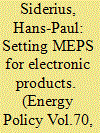|
|
|
Sort Order |
|
|
|
Items / Page
|
|
|
|
|
|
|
| Srl | Item |
| 1 |
ID:
113450


|
|
|
|
|
| Publication |
2012.
|
| Summary/Abstract |
In the development of effective product efficiency policy, the critical element for policy makers is comprehensive, independent information. However, easily accessible, reliable information on the energy performance of products and policies is often scarce within a particular market, and rarer still if the policy maker is seeking comparisons on an international level. This article presents a method (Mapping & Benchmarking) to compare energy efficiency of products across countries, and the results for 3 products: refrigerators-freezers, washing machines and laundry driers. The results show an improvement of the efficiency over time for these products. However, part of this improvement is due to increased capacity of the products and not to lower energy consumption. Therefore policy makers should consider the development of policies based on product energy consumption and not (only) on product efficiency in order to capture the full potential of technology improvements for energy savings. Results for refrigerator-freezers suggest that in the long run both a policy strategy where minimum efficiency requirements are prominent and a policy strategy where a mandatory energy label is prominent can provide for increasing efficiencies.
|
|
|
|
|
|
|
|
|
|
|
|
|
|
|
|
| 2 |
ID:
125463


|
|
|
|
|
| Publication |
2013.
|
| Summary/Abstract |
Minimum efficiency performance standards (MEPS) are an important policy instrument to raise the efficiency of products. In most schemes the concept of life cycle costs (LCC) is used to guide setting the MEPS levels. Although a large body of literature shows that product cost is decreasing with increasing cumulative production, the experience curve, this is currently not used for setting MEPS. This article shows how to integrate the concept of the experience curve into LCC calculations for setting MEPS in the European Union and applies this to household laundry driers, refrigerator-freezers and televisions. The results indicate that for driers and refrigerator-freezers at least twice the energy savings compared to the current approach can be achieved. These products also show that energy label classes can successfully be used for setting MEPS. For televisions an experience curve is provided, showing a learning rate of 29%. However, television prices do not show a relation with energy efficiency but are to a large extent determined by the time the product is placed on the market. This suggests to policy makers that for televisions and other products with a short (re)design and market cycle timing is more important than the MEPS levels itself.
|
|
|
|
|
|
|
|
|
|
|
|
|
|
|
|
| 3 |
ID:
132741


|
|
|
|
|
| Publication |
2014.
|
| Summary/Abstract |
When analysing price, performance and efficiency data for 15 consumer electronic and information and communication technology products, we found that in general price did not relate to the efficiency of the product. Prices of electronic products with comparable performance decreased over time. For products where the data allowed fitting the relationship, we found an exponential decrease in price with an average time constant of ?0.30 [1/year], meaning that every year the product became 26% cheaper on average.
The results imply that the classical approach of setting minimum efficiency performance standards (MEPS) by means of life cycle cost calculations cannot be applied to electronic products. Therefore, an alternative approach based on the improvement of efficiency over time and the variation in efficiency of products on the market, is presented. The concept of a policy action window can provide guidance for the decision on whether setting MEPS for a certain product is appropriate. If the (formal) procedure for setting MEPS takes longer than the policy action window, this means that the efficiency improvement will also be achieved without setting MEPS. We found short, i.e. less than three years, policy action windows for graphic cards, network attached storage products, network switches and televisions.
|
|
|
|
|
|
|
|
|
|
|
|
|
|
|
|
|
|
|
|
|